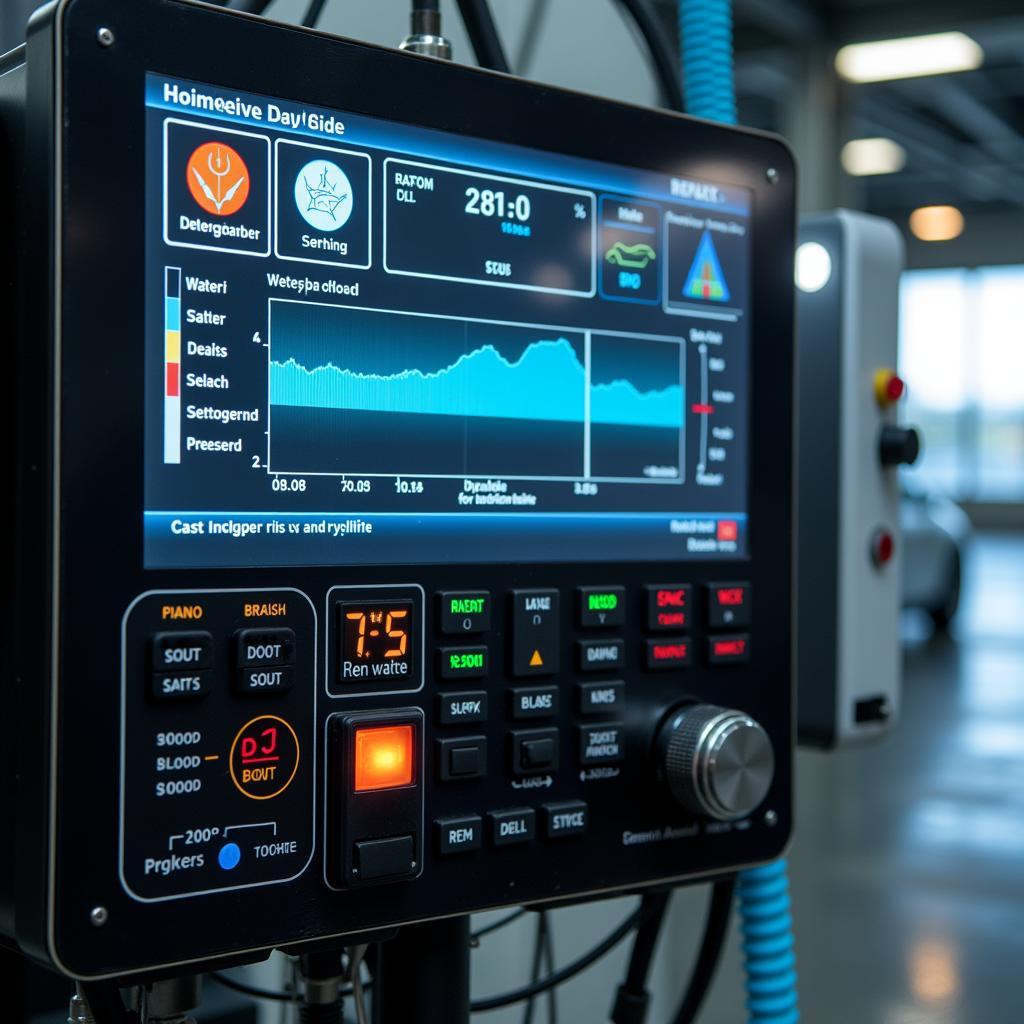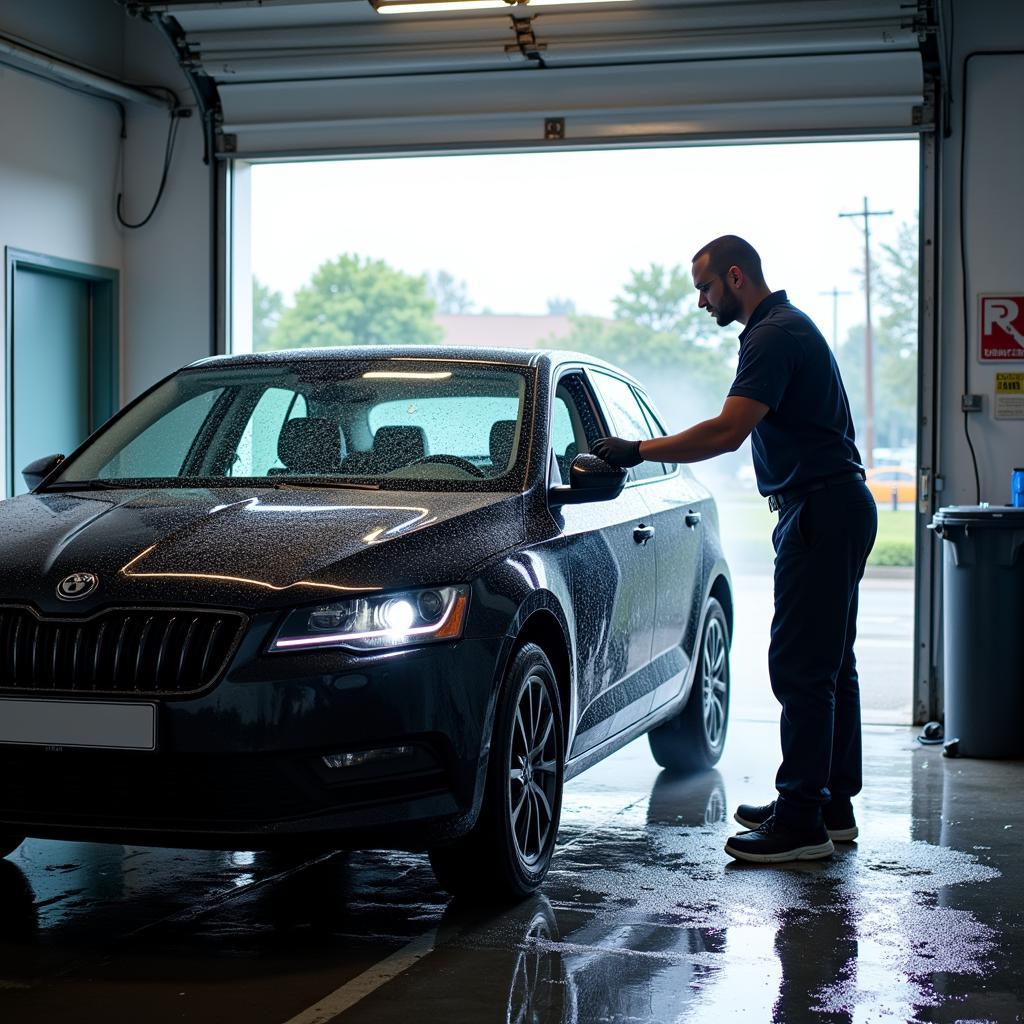Automated car washes have become a ubiquitous part of the modern landscape, offering a quick and convenient way to keep our vehicles clean. But beyond the swirling brushes and soapy sprays lies a fascinating world of technology and innovation. This article will explore the intricacies of automated car washes, from the basic principles to the latest advancements, providing valuable insights for car owners and industry professionals alike.
Types of Automated Car Washes
There are several types of automated car washes, each with its own set of advantages and disadvantages. Understanding these differences can help you choose the best option for your vehicle and budget. The most common types include:
- Touchless Car Washes: These systems use high-pressure water jets and specialized cleaning solutions to remove dirt and grime without physical contact. This minimizes the risk of scratches but may not be as effective on heavily soiled vehicles.
- Soft-Touch Car Washes: Soft-touch washes utilize closed-cell foam brushes that gently glide over the car’s surface. These brushes are designed to be less abrasive than traditional bristle brushes, offering a good balance between cleaning power and paint protection.
- Tunnel Car Washes: These are the most common type of automated car wash, featuring a conveyor belt that moves the vehicle through a series of cleaning stages. Tunnel washes can offer a variety of services, from basic washes to complete detailing packages.
- In-Bay Automatics: In-bay automatics are stationary systems where the vehicle remains parked while a moving apparatus performs the wash. These systems are often found at gas stations and convenience stores.
After a thorough wash at a facility like Raceway Express Car Wash, consider the maintenance and preventative care options available.
The Technology Behind Automated Car Washes
Automated car washes rely on a complex interplay of mechanical and chemical processes. From the sophisticated sensors that guide the vehicle through the wash to the specialized detergents that break down dirt and grime, every component plays a crucial role.
Sensors and Control Systems
Modern automated car washes use an array of sensors to monitor the vehicle’s position, size, and shape. This data is fed to a central control system that orchestrates the various cleaning stages, ensuring that each area of the vehicle is thoroughly cleaned. These systems also control the flow of water, detergents, and other cleaning agents, optimizing efficiency and minimizing waste.
Cleaning Solutions and Chemicals
The effectiveness of an automated car wash depends heavily on the quality of the cleaning solutions used. These specialized detergents are formulated to break down dirt, grease, and other contaminants without damaging the vehicle’s paint or other surfaces. Many modern car washes also incorporate environmentally friendly cleaning agents to minimize their impact on the ecosystem.
 Automated Car Wash Control System Display
Automated Car Wash Control System Display
Choosing the Right Automated Car Wash
With so many options available, choosing the right automated car wash can be a daunting task. Consider the following factors to make an informed decision:
- Your Vehicle’s Condition: For vehicles with heavy soiling, a touchless wash may not be sufficient. A soft-touch or tunnel wash with more aggressive cleaning capabilities might be necessary.
- Your Budget: Automated car washes offer a range of pricing options, from basic washes to premium detailing packages.
- Your Location: The availability of different types of car washes varies depending on your location.
Duckys Car Wash is known for its variety of wash options, catering to different needs and budgets.
Maintaining Your Car’s Finish After an Automated Wash
While automated car washes offer a convenient cleaning solution, it’s important to take steps to maintain your car’s finish. Regular waxing and polishing can help protect the paint from the elements and maintain its shine.
The Future of Automated Car Washes
The automated car wash industry is constantly evolving, with new technologies and innovations emerging all the time. From water reclamation systems that minimize environmental impact to advanced sensor technology that optimizes cleaning performance, the future of automated car washes is bright.
Fuller’s Car Wash is an example of a company that prioritizes eco-friendly practices in its operations.
Water Conservation and Environmental Sustainability
As concerns about water conservation grow, many automated car washes are adopting water reclamation systems that recycle and reuse water. These systems not only reduce water consumption but also minimize the discharge of wastewater into the environment.
Advanced Sensor Technology and Artificial Intelligence
The integration of advanced sensor technology and artificial intelligence is poised to revolutionize the automated car wash experience. These technologies can further enhance cleaning precision, personalize the wash process based on individual vehicle needs, and even predict maintenance requirements.
 Car Wash Attendant Inspecting Vehicle Before Automated Wash
Car Wash Attendant Inspecting Vehicle Before Automated Wash
Conclusion
Automated car washes offer a convenient and efficient way to keep our vehicles clean. By understanding the different types of washes, the technology involved, and the factors to consider when choosing a wash, you can ensure that your vehicle receives the best possible care. Regular maintenance after an automated wash is also essential for preserving your car’s finish and extending its lifespan. With continuous advancements in technology, the future of automated car washes promises even more efficient, eco-friendly, and personalized cleaning solutions.
FAQ
-
Are touchless car washes better for my car’s paint? While they minimize scratching, they might not clean as effectively as soft-touch options.
-
How often should I wash my car in an automated car wash? This depends on your driving conditions and personal preference, but generally, every two weeks is a good starting point.
-
Can I use an automated car wash on a leased vehicle? Yes, but check your lease agreement for any specific restrictions.
Common Scenarios and Questions
-
Scenario: You notice swirl marks on your car after a wash. Question: What type of wash caused this, and how can I fix it?
-
Scenario: You live in a drought-prone area. Question: Are there water-saving options available at automated car washes?
-
Scenario: You have a heavily soiled truck. Question: Which type of automated wash is best suited for my needs?
Related Articles and Further Exploration
- Explore the differences between various car wash chains like Landshark Car Wash and Riptide Car Wash.
- Learn more about car detailing and paint protection techniques.
Need Assistance?
Contact us for any inquiries or assistance regarding car washes and diagnostic solutions.
- WhatsApp: +1(641)206-8880
- Email: [email protected]
- Address: 276 Reock St, City of Orange, NJ 07050, United States
Our customer support team is available 24/7.


